View in other NatureServe Network Field Guides
NatureServe
Montana
Utah
Wyoming
Idaho
Wisconsin
British Columbia
South Carolina
Yukon
California
New York
Woolly Fleabane - Erigeron lanatus
State Rank Reason (see State Rank above)
Only known in Montana from a few occurrences in Glacier National Park, though the high elevation habitat as well as the occurrences all being within the Park boundary greatly diminish the potential for negative impacts. The likelihood of additional occurrences being located appears good.
- Details on Status Ranking and Review
Population Size
Score2 - Small: Generally 2,000-10,000 individuals.
Range Extent
Score2 - Regional or State Endemic or Small Montana Range: Generally restricted to an area <100,000 sq. miles (equivalent to 2/3 the size of Montana or less) or Montana contributes 50% or more of the species’ range or populations OR limited to 2-3 Sub-basins in Montana.
Area of Occupancy
Score2 - Low: Generally occurring in 4-10 Subwatersheds (6th Code HUC’s).
Environmental Specificity
Score1 - Moderate: Species is restricted to a specific habitat that is more widely distributed or to several restricted habitats and is typically dependent upon relatively unaltered, good-quality habitat (C Values of 5-7).
Trends
ScoreNA - Rank factor not assessed.
CommentTrends unknown, though populations are likely stable or experiencing only minor declines.
Threats
Score0-1 - Low to Medium.
Intrinsic Vulnerability
Score0-1 - Low to Moderate Vulnerability.
Raw Conservation Status Score
Score
7 to 9 total points scored out of a possible 16 (Rarity factors and threats only).
General Description
Fibrous-rooted perennial from a slender-branched caudex. Stems ascending to erect, 3–10 cm, scapose. Herbage villous, minutely glandular above. Leaves basal and cauline; blades linear-oblanceolate to spatulate, 1–3 cm long, entire or 1- to 3-lobed at the tip. Heads radiate, solitary. Involucres hemispheric, 8–12 mm high; phyllaries in 2 or 3 series, shaggy wooly-villous, purple-tipped, minutely glandular. Rays 30 to 80, white to purplish; ligules 7–8 mm long. Disk corollas 4–5 mm long. Achenes 3–4 mm long (
Lesica et al. 2012. Manual of Montana Vascular Plants. BRIT Press. Fort Worth, TX).
Species Range
Montana Range
Range Descriptions
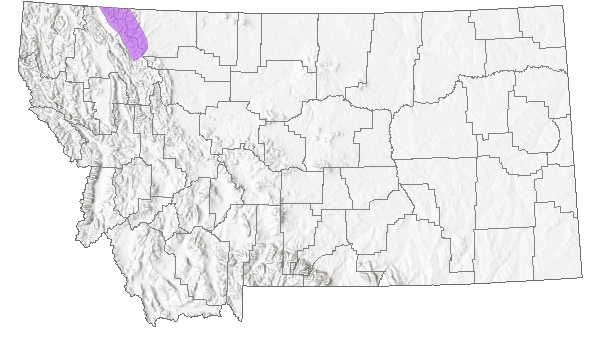
 Native
Native
Range Comments
Flathead and Glacier counties; BC, AB, sporadically south to CO (Lesica et al. 2012. Manual of Montana Vascular Plants. BRIT Press. Fort Worth, TX).
Observations in Montana Natural Heritage Program Database
Number of Observations: 18
(Click on the following maps and charts to see full sized version)
Map Help and Descriptions
Relative Density
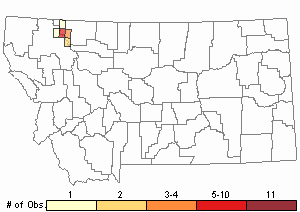
Recency
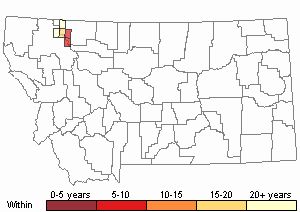
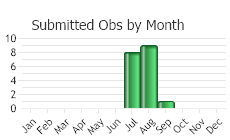
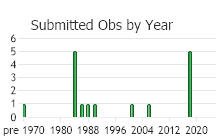
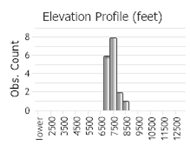 (Observations spanning multiple months or years are excluded from time charts)
(Observations spanning multiple months or years are excluded from time charts)
Habitat
Limestone talus slopes in the alpine zone.
Ecology
POLLINATORS The following animal species have been reported as pollinators of this plant species or its genus where their geographic ranges overlap:
Bombus bifarius,
Bombus centralis,
Bombus fervidus,
Bombus flavifrons,
Bombus huntii,
Bombus melanopygus,
Bombus mixtus,
Bombus rufocinctus,
Bombus occidentalis, and
Bombus insularis (Thorp et al. 1983, Wilson et al. 2010, Colla and Dumesh 2010, Koch et al. 2012).
Stewardship Responsibility
References
- Literature Cited AboveLegend:
 View Online Publication
View Online Publication Colla, S.R. and S. Dumesh. 2010. The bumble bees of southern Ontario: notes on natural history and distribution. Journal of the Entomological Society of Ontario 141:39-68.
Colla, S.R. and S. Dumesh. 2010. The bumble bees of southern Ontario: notes on natural history and distribution. Journal of the Entomological Society of Ontario 141:39-68. Koch, J., J. Strange, and P. Williams. 2012. Bumble bees of the western United States. Washington, DC: USDA Forest Service, Pollinator Partnership. 143 p.
Koch, J., J. Strange, and P. Williams. 2012. Bumble bees of the western United States. Washington, DC: USDA Forest Service, Pollinator Partnership. 143 p. Lesica, P., M.T. Lavin, and P.F. Stickney. 2012. Manual of Montana Vascular Plants. Fort Worth, TX: BRIT Press. viii + 771 p.
Lesica, P., M.T. Lavin, and P.F. Stickney. 2012. Manual of Montana Vascular Plants. Fort Worth, TX: BRIT Press. viii + 771 p. Thorp, R.W., D.S. Horning, and L.L. Dunning. 1983. Bumble bees and cuckoo bumble bees of California (Hymenoptera: Apidae). Bulletin of the California Insect Survey 23:1-79.
Thorp, R.W., D.S. Horning, and L.L. Dunning. 1983. Bumble bees and cuckoo bumble bees of California (Hymenoptera: Apidae). Bulletin of the California Insect Survey 23:1-79. Wilson, J.S., L.E. Wilson, L.D. Loftis, and T. Griswold. 2010. The montane bee fauna of north central Washington, USA, with floral associations. Western North American Naturalist 70(2): 198-207.
Wilson, J.S., L.E. Wilson, L.D. Loftis, and T. Griswold. 2010. The montane bee fauna of north central Washington, USA, with floral associations. Western North American Naturalist 70(2): 198-207.
- Additional ReferencesLegend:
 View Online Publication
View Online Publication
Do you know of a citation we're missing? Lesica, P., M.T. Lavin, and P.F. Stickney. 2022. Manual of Montana Vascular Plants, Second Edition. Fort Worth, TX: BRIT Press. viii + 779 p.
Lesica, P., M.T. Lavin, and P.F. Stickney. 2022. Manual of Montana Vascular Plants, Second Edition. Fort Worth, TX: BRIT Press. viii + 779 p.
- Web Search Engines for Articles on "Woolly Fleabane"





